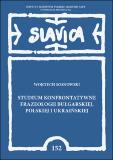Studium konfrontatywne frazeologii bułgarskiej, polskiej i ukraińskiej
A Contrastive Study of Bulgarian, Polish and Ukrainian Phraseology
Author(s): Wojciech Paweł Sosnowski
Subject(s): Language and Literature Studies, Comparative Linguistics, Descriptive linguistics
ISSN: 0208-4058
Published by: Instytut Slawistyki Polskiej Akademii Nauk
Keywords: Bulgarian phraseology; Polish phraseology; Ukrainian phraseology; language corpus; phraseological homonyms; phraseological calques; neo-phraseology
Summary/Abstract: This book is devoted to research on the latest phraseological resources of Slavic languages which so far have not been compared in terms of potential similarities in their developmental tendencies. The study identifies the course of tendencies in the development of phraseological resources, pinpoints the units which are highly active in the languages under discussion, and examines similarities and differences in the creation and use of their phraseological resources. The analysis considers two groups of phraseologisms: active general phraseology and the latest phraseology. Contrastive analysis as the adopted study method has come as a compromise between different linguistic schools, in this case Bulgarian, Polish and Ukrainian. This is reflected in specification of many important linguistic terms and in the search for their common denominator. In accordance with the adopted assumptions, the study examines relatively stable semantically indivisible phraseological units which express meanings that are not the sum of the meanings of their components and are reproduced in speech as ready-made word combinations. Thanks to the description of these units by means of definition models on the one hand, and to proceeding from meaning to form on the other, it was possible to analyse material from the three languages at the same time, applying quantitative and qualitative criteria. The work considers about 1,500 phraseological units, 500 from each language. An index of the most frequently used phraseologisms compiled as part of the study includes phraseological units which are not recorded in any other works. The principal aim was to compare and contrast Bulgarian, Polish and Ukrainian phraseologisms in terms of such important aspects as: – types of lexicographic description; – the role of corpora in recording phraseologisms; – linguistic homonymy; – ways of enriching the phraseological resources (e.g. calquing and borrowing phraseological units from different varieties of English); – the presence and vitality of phraseologisms with a cultural component; – the emergence of the latest phraseologisms and the attendant derivational processes, as well as similarities and differences observed in the process of enriching the phraseological resources. This contrastive analysis indicates that the Bulgarian, Polish and Ukrainian languages react to changes in socio-economic and cultural reality in a similar way, and that they describe and interpret these changes by means of many new phraseologisms which emerge following similar derivational processes.
The work was financed from the “Excellent Science” Programme of the Polish Minister of Education and Science.
Series: Prace Slawistyczne. Slavica
- E-ISBN-13: 978-83-66369-44-3
- Print-ISBN-13: 978-83-66369-45-0
- Page Count: 218
- Publication Year: 2021
- Language: Polish
- eBook-PDF

